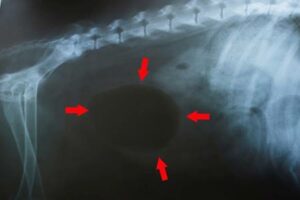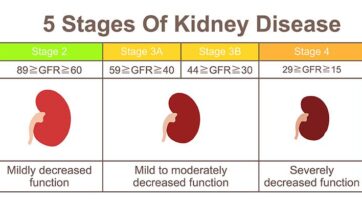
MORE OPTIONS FOR KIDNEY DISEASE TREATMENT
When a dog is diagnosed with acute renal disease hospitalization is required with quick administration of intravenous fluids at carefully managed, above-maintenance levels, to restore hydration and prompt urination. An indwelling urinary catheter can be inserted so that urine output can be quantified. When necessary, urine production can be enhanced by the administering of certain drugs. When electrolyte or acid-based imbalances are preset, the attending veterinarian can prescribe supplements to restore normal levels. There are other medications available for relief of abdominal discomfort and manage vomiting (emesis).
Dogs with chronic kidney disease usually require hospitalization to treat dehydration by administering appropriate intravenous fluids and provide essential nutritional support. Many veterinarians recommend feeding a “renal diet” that is high in quality and low sodium and phosphorus. There a lot of questions as to how effective low-protein diets are for dogs with chronic kidney disease. Some veterinarians believe that a high-protein diet, or a diet containing poor-quality protein sources, increase the nitrogen load on the liver and kidneys, while others believe that feeding a food with high biological protein values can actually help preserve or at least prolong kidney function. Because dogs with kidney disease lose their appetite and suffer dramatic weight loss, it is more important to maintain sufficient caloric intake than it is to mange the precise nutritional components of their diet. Appetite stimulants, as well as medications to reduce gastric acid and relieve vomiting, are available from a veterinarian. There are other soothing products that can be given to relieve gastric ulcers, which often accompany kidney disease. Phosphate-binding drugs may be prescribed to lower blood phosphorous levels, and sodium-bicarbonate or vitamin B supplements may be recommended in certain cases. Over time, it may become necessary for the owner to administer subcutaneous fluids periodically, and perhaps daily in the very end-stage of disease.
There have been several forms of dialysis used to manage kidney disease in dogs by taking over most of the filtering responsibilities of the kidneys. Peritoneal dialysis involves injecting a special fluid into the abdominal cavity through a catheter. This fluid is designed to absorb toxins across tissue and vascular boundaries and is removed through the same catheter after a predetermined period of time. Peritoneal dialysis is particularly useful for acute kidney disease caused by poisoning.
Hemodialysis is a blood purification process in which the dog’s anticoagulated blood is circulated through an artificial kidney. The blood is exposed to a special solution across a semi-permeable membrane that essentially filters out toxins and metabolic waste products. This procedure is available at only a handful of veterinary referral centers, and is extremely expensive and time-consuming. Each hemodialysis session lasts 3 to 5 hours and must be preformed up to 3 times a week. Like peritoneal dialysis, hemodialysis is best used to rest the kidneys after acute toxic events.
Kidney transplants have been performed in companion animals, mostly in cats but also in dogs. They are uncommon and costly, and are performed only at a few specialized veterinary hospitals. Issues surrounding canine kidney transplantation are similar to those in humans, including finding an appropriate donor and managing post-operative organ rejection. One method being used to identify potential donors is to test shelter dogs for tissue compatibility. Once a donor dog is found, one of it’s kidneys is removed and transplanted into the dog with kidney failure. Dogs, like people, can live a full, productive life with one functional kidney. The recipient dog’s owner usually agrees in advance to adopt the donor dog and provide it with a loving home for the rest of it’s life.
CONCLUSION
The outlook for dogs with renal kidney disease is highly variable and can range from days to years following diagnosis. Dogs with chronic kidney failure have a more guarded prognosis than those with acute disease.
